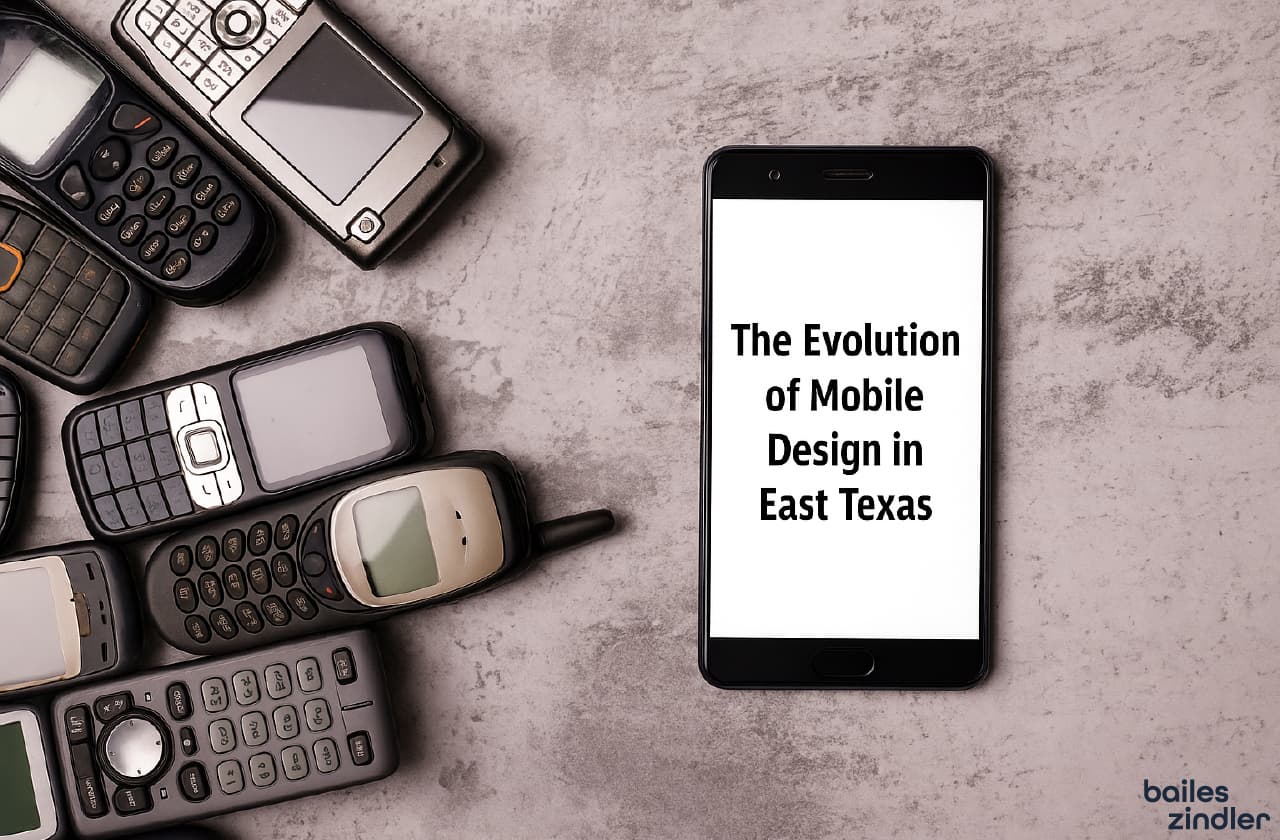From WAP to Wow: The Complete Journey of Mobile Website Design and Why It Matters for East Texas Businesses: Explore the transformative history of mobile web design, from early 2000s WAP browsers to modern responsive websites. Learn how East Texas businesses can leverage cutting-edge mobile design to drive growth and user engagement.
Introduction: The Mobile Web’s Unexpected Journey
In the early 2000s, few could have predicted how dramatically mobile website design would reshape the digital landscape. What began as a clunky, limited experience has transformed into a sophisticated, user-centric ecosystem that drives business growth across East Texas and beyond. At Bailes + Zindler, we’ve witnessed this evolution firsthand, helping local businesses in Houston, Tyler, and across the region build websites that don’t just look good - they perform.
The Early Days: WAP and Primitive Mobile Browsing
 This is how it used to be done: WAP Proof simulating a mobile site on a Sony Ericsson T610 - showcasing the limited, text-heavy experience developers worked with in the early 2000s.
This is how it used to be done: WAP Proof simulating a mobile site on a Sony Ericsson T610 - showcasing the limited, text-heavy experience developers worked with in the early 2000s.
When mobile internet first emerged, it was barely recognizable by today’s standards. Wireless Application Protocol (WAP) browsers offered a rudimentary experience, with limited graphics, slow connections, and stripped-down content. Imagine trying to read a website through a tiny screen with monochrome displays and painfully slow data speeds. Business websites were more of a theoretical concept than a practical marketing tool.
Key characteristics of early mobile browsing:
- Extremely limited screen resolutions
- Minimal HTML support
- Text-heavy interfaces
- Expensive data connections
- Limited device capabilities
The Rise of M-Dot Websites: A Transitional Era
 A side-by-side look at the evolution of mobile web design: from a cluttered desktop-style layout to a streamlined m-dot site - Jurassic Park style.
A side-by-side look at the evolution of mobile web design: from a cluttered desktop-style layout to a streamlined m-dot site - Jurassic Park style.
As smartphones began to emerge, businesses started creating separate mobile websites (e.g., m.domain.com), which represented a significant leap forward. These dedicated mobile sites offered streamlined experiences specifically designed for smaller screens. While revolutionary for their time, they came with substantial drawbacks.
Challenges of M-dot websites:
- Duplicate content management
- Separate SEO strategies
- Higher development and maintenance costs
- Inconsistent user experiences across devices
The Responsive Design Revolution
 Responsive design in action: one website adapting seamlessly across laptop, tablet, and smartphone - an early 2010s milestone in mobile web evolution.
Responsive design in action: one website adapting seamlessly across laptop, tablet, and smartphone - an early 2010s milestone in mobile web evolution.
Around 2010, responsive web design emerged as a game-changing approach. Pioneered by designers like Ethan Marcotte, this methodology allowed websites to dynamically adapt to any screen size. CSS media queries became the technical backbone, enabling fluid layouts that could reshape themselves intelligently.
For East Texas businesses, this meant:
- A single website that serves all devices
- Consistent brand experience
- Lower development and upkeep costs
- Improved performance in search rankings
Want to see how responsive design can improve your website? Check out our web design services.
Mobile-First Indexing: Google’s Transformative Mandate
 Today’s reality: most web traffic starts on mobile. Google’s mobile-first indexing reflects how people actually engage - with their phones first.
Today’s reality: most web traffic starts on mobile. Google’s mobile-first indexing reflects how people actually engage - with their phones first.
Google’s move to mobile-first indexing fundamentally reshaped how websites are developed and ranked. The search giant now uses the mobile version of content for indexing and ranking.
This shift meant businesses could no longer treat mobile as an afterthought - it became the primary consideration.
Mobile Optimization Strategies for Local Businesses
For companies in East Texas and Houston, mobile optimization isn’t just a technical detail - it’s a competitive advantage. Our team at Bailes + Zindler has consistently seen how mobile-friendly websites:
- Increase local search visibility
- Improve user engagement and time on site
- Boost form submissions and conversions
- Enhance trust and brand credibility
Explore our SEO services for mobile-first growth strategies.
Progressive Web Apps: The Next Frontier
Progressive Web Apps (PWAs) represent the cutting edge of mobile web design. They combine the best of web and mobile apps to deliver seamless, fast, app-like experiences.
Key features of PWAs:
- Offline functionality
- Lightning-fast loading speeds
- Native-like usability
- Lower development costs vs. native apps
Future Trends in Mobile Web Design
Looking ahead, several emerging trends will shape the next era of mobile web experiences:
- 5G Connectivity → Blazing speeds unlock richer media and interactions
- AI Personalization → Smarter recommendations, tailored content
- Core Web Vitals → Google’s focus on page speed, responsiveness, and stability
- New Frameworks → Tools like Tailwind, Astro, and Next.js make development faster and more scalable
East Texas businesses that adopt these trends early will stay ahead of the curve.
Conclusion: Your Mobile Strategy Matters
Mobile website design is no longer optional - it’s essential. Whether you’re a lawyer in Tyler, a retailer in Houston, or a service provider across East Texas, your digital presence must be mobile-first.
At Bailes + Zindler, we don’t just build websites. We create digital growth engines that perform across every device.
Ready to turn mobile traffic into real growth?
We’ll help you build a lightning-fast, SEO-optimized, and visually compelling mobile experience.

